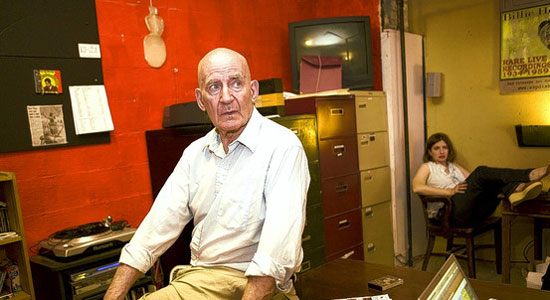 Few bands survive the reboot Alice In Chains launched in 2008, six years after the death of its troubled powerhouse singer, Layne Staley. Guitarist Jerry Cantrell admits the idea of reemerging from stasis with a new vocalist, William DuVall, felt like a gamble. The result was Black Gives Way To Blue, a work worthy of standing alongside the band’s masterpiece, 1992’s Dirt. Though few would have predicted such a return to form, the album was certified gold, topped scads of best-of lists and launched two full tours. The new The Devil Put Dinosaurs Here stays true to the Alice In Chains sound, a dense shroud of gloom occasionally lifted by soaring harmonies and delicate riffs. For every dirge stomp like “Pretty Done” and the menacing creep of “Lab Monkey,” there are echoes of Jar Of Flies’ haunted acoustic beauty (“Voices,” “Choke”) or the filthy groove of “Stone,” the album’s second single. DuVall will be guest editing magnetmagazine.com all week. Read our brand new Alice In Chains feature.
Few bands survive the reboot Alice In Chains launched in 2008, six years after the death of its troubled powerhouse singer, Layne Staley. Guitarist Jerry Cantrell admits the idea of reemerging from stasis with a new vocalist, William DuVall, felt like a gamble. The result was Black Gives Way To Blue, a work worthy of standing alongside the band’s masterpiece, 1992’s Dirt. Though few would have predicted such a return to form, the album was certified gold, topped scads of best-of lists and launched two full tours. The new The Devil Put Dinosaurs Here stays true to the Alice In Chains sound, a dense shroud of gloom occasionally lifted by soaring harmonies and delicate riffs. For every dirge stomp like “Pretty Done” and the menacing creep of “Lab Monkey,” there are echoes of Jar Of Flies’ haunted acoustic beauty (“Voices,” “Choke”) or the filthy groove of “Stone,” the album’s second single. DuVall will be guest editing magnetmagazine.com all week. Read our brand new Alice In Chains feature.

DuVall: “The artist alone decides what you will hear on their ESP-Disk.” This is the slogan found on albums issued by the seminal record label founded by Bernard Stollman in 1964. ESP-Disk is best known as the label that funded and released the first recordings by Albert Ayler, Giuseppe Logan, Paul Bley, Milford Graves and many others, as well as important titles by Ornette Coleman, Cecil Taylor, Sun Ra, Pharoah Sanders, etc. Despite (or perhaps because of) his having previously had little exposure to jazz of any kind, Stollman instinctively knew that what these musicians were doing was important and needed to be documented regardless of its lack of commercial appeal or the often hostile reactions from jazz critics and fans alike. “I knew from the inception that it might be a generation before this music was accepted,” says Stollman in the recent book, Always In Trouble: An Oral History Of ESP-Disk, The Most Outrageous Record Label In America.
After establishing itself as the most sympathetic and prolific label for The New Thing In Jazz, releasing some 45 titles in its first 18 months alone, ESP-Disk soon branched out into “freak-folk” and rock, becoming the first label home for the Fugs, Godz, Pearls Before Swine and even Charles Manson, and also releasing definitive spoken-word albums by the likes of Timothy Leary and William Burroughs. It was a one-stop shop for truly cutting-edge art in what was shaping up to be the most revolutionary decade of the 20th Century. Not surprisingly, ESP-Disk attracted the attention of the powers-that-be and was targeted by the same FBI COINTELPRO surveillance that plagued everyone from the Black Panthers to John Lennon. Between that and Stollman’s admittedly naïve business practices, the label was shut down in 1974.
However, after several decades of dormancy, bootlegs and shady foreign licensing deals, Stollman, now in his 80s, is once again firmly back at the helm, releasing beautifully remastered CDs, digital downloads and limited-edition vinyl LPs of the label’s entire catalog, including recently acquired archival tapes by more traditional luminaries like Billie Holiday and Charlie Parker and new signings like Eli Keszler, Talibam! and Charles Gayle.
The ESP-Disk story is one of quintessential American independence. Whatever else might be said of Stollman, one cannot deny the label’s place in the cultural firmament or the importance of the work he continues to do. Having interviewed him on camera for my film on Milford Graves, I found him to be a genial, self-effacing man and a passionate curator. ESP-Disk is Stollman’s life’s work, and he is justifiably both proud and humbled by it. This man could have made a fortune as a lawyer in the straight world, even parlaying his “colorful ’60s past” to great effect like so many of his contemporaries. Instead, at an age when most people of his background and professional qualifications are retiring to some oceanfront property, Stollman lives in the same rough-hewn Brooklyn storefront that serves as the current headquarters of his label. It is an almost ascetic existence: a kitchenette, a couple of desks and enough boxes of CDs and vinyl LPs to create a scale model of the Manhattan skyline just across the bridge. Here Stollman, with help from a minimal staff, goes about doing what he loves—serving the dedicated global (and now multi-generational) audience that he helped to create. I can certainly think of worse ways to end up.
Video after the jump.






